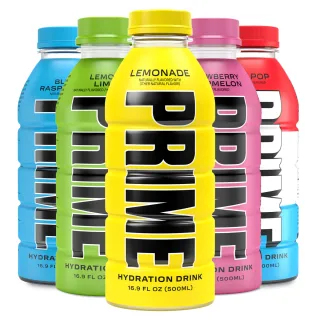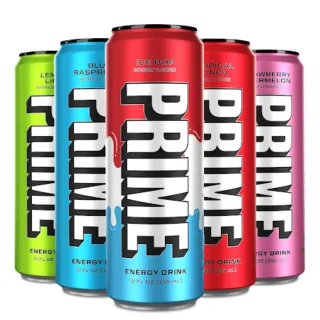Founded by internet personality and part-time WWE superstar Logan Paul and fellow YouTuber KSI, PRIME Energy drinks exploded onto the scene and have become the most popular choice for energy drink lovers.
Yet the beverage, which claims to have zero added sugar and is vegan, has also generated a lot of negative attention, particularly due to its high caffeine content. In fact, a U.S. Senate has called upon the FDA to investigate the beverage, especially as it’s being marketed as a product to children and teens.
PRIME Energy: A Caffeine Health Risk
This past Sunday, Senate Majority Leader Chuck Schumer held a press conference in which he called on the U.S. Food & Drug Administration (FDA) to conduct an investigation into PRIME Energy’s marketing practices. Aside from PRIME Energy, the brand also offers a caffeine-free drink called Prime Hydration, and Schumer alleges that these two beverages are marketed “in nearly identical form”.

PRIME HYDRATION

PRIME ENERGY
In a letter to the regulatory body, Schumer adds that since there is little noticeable difference in the online marketing of the two drinks, this can lead parents to purchase the highly-caffeinated beverage under the belief that they are purchasing a caffeine-free beverage for their kids.
PRIME Energy Drink has so much caffeine that it could endanger kids’ health.
But it’s being marketed to kids!
Parents and pediatricians are worried.
The FDA must investigate PRIME for its absurd caffeine content and its marketing targeting kids on social media. https://t.co/8f8Udp3dZu
— Chuck Schumer (@SenSchumer) July 9, 2023
What is the caffeine content of popular beverages?
Per FDA regulations, any beverage that has up to 400 milligrams of caffeine (four or five cups of coffee) per day is safe to consume. As such, in a statement to the BBC, a PRIME representative shared that the beverage “contains a comparable amount of caffeine to other top-selling energy drinks, all falling within the legal limit of the countries it’s sold in. It complied with all FDA guidelines before hitting the market.”
|
BEVERAGE |
CAFFEINE CONTENT |
|
Prime Energy |
200 mg (355ml can) |
|
Red Bull |
80 mg (250ml) |
|
Monster |
160 mg (473ml) |
|
Coca Cola original |
32 mg (330ml) |
|
Brewed coffee |
135 mg (235ml) |
|
Black tea |
30-50 mg (235ml) |
Source: caffeineinformer.com/Health Canada
Warning labels
Defending their products, PRIME representatives point out how their product is clearly labeled “not recommended for children under 18.”
That said, Jennifer Temple, Ph.D., director of the nutrition and health research laboratory at the University of Buffalo, told Health that studies have shown that warning labels on energy drinks can often entice someone to consume the beverage.
Additionally, Temple added that energy drinks like PRIME are not regulated like sodas because they’re classified as supplements, not beverages, due to their lack of nutrients, like electrolytes and vitamins.
How Does Caffeine Affect Your Health?
Due to the high caffeine content and possible health effects on young children, some schools in the United Kingdom and Australia have banned the beverage.
Also, in Canada, the company has yet to officially launch its product. Yet Canadian health officials have recalled beverages from across the country as consumers are not allowed to “consume, serve, use, sell, or distribute” drinks with more than 180 mg of caffeine.
Meanwhile, the Canadian Food Inspection Agency revealed that officials are “actively working to address this issue” of stores that are possibly selling the beverage without approval.
Sadly, there are no known restrictions for purchasing the drink in the US, which raises the question of how the high caffeine content may affect your health.
Consuming too much caffeine can trigger the following symptoms in adults:
- Insomnia
- Sleep deprivation
- Anxiety
- Rapid heart rate
- Lack of appetite
- Upset stomach
- Nausea
- Headache
- Feelings of unhappiness
- Dizziness
- Irregular heartbeat
- Panic attacks
How does caffeine impact children?
Erin Palinski-Wade, a nutrition consultant told Health, that children who consume high levels of caffeine can experience hyperactivity, anxiety, racing heartbeat, insomnia, irritability, and poor sleep cycle.
Considering that the Centers for Disease Control and Prevention (CDC) has already warned that two-thirds of children and teens under-18 are not getting enough sleep each night, this is a serious cause for concern.
In severe cases, some children may experience a caffeine overdose, which can include symptoms like vomiting, high blood pressure, racing heart, heart rhythm problems, disorientation, and hallucinations.
Will the FDA investigate?
Speaking to NPR, the FDA acknowledged to the recipient of Schumer’s letter, and stated that they were reviewing the concerns and that they would respond to Schumer directly. Additionally, they added that they would possibly collaborate with the Federal Trade Commission about reviewing the marketing claims.
In responding to the backlash, a PRIME representative stated that “As a brand, our top priority is consumer safety, so we welcome discussions with the FDA or any other organization regarding suggested industry changes they feel are necessary in order to protect consumers.”
How Can I Boost My Energy Levels?
If you’re looking to maintain your energy levels without relying on caffeine. Per Dr. John Demartini, a human behavior specialist and health professional, here are 8 ways you can naturally enjoy high energy levels:
- Prioritize your daily actions. When you fill your day with high-priority, energizing, and inspiring actions, your day won’t fill up with low-priority, de-energizing, and despairing distractions. The former elevates your self-worth, and the latter drains and lowers it.
- Prioritize what you eat. Eat the most vital and invigorating foods, and eat them with moderation, rhythm, and consistency. Eat to live. Don’t live to eat. Fuel your body with quality nutrients.
- Drink clean water – the universal solvent – more than sweet or falsely energizing drinks that initiate volatilities in your blood sugar levels that induce rises and falls.
- Do moderate exercises such as walking, swimming, yoga, or dancing.
- Breathe deeply and diaphragmatically until it is your daily standard and habit, and you will have a tight abdomen and loose shoulders instead of tight shoulders and a loose abdomen.
- Do not eat heavy and lie down. Eat light at night.
- Read classical and inspiring books written by inspiring originators and masters.
- Document what you are grateful for each day. When you are grateful for what experiences you receive, you receive more experiences to be grateful for, and you will generate an increase in energy and physical well-being.
Want to know more?
Healthy exercise like yoga can make you feel more rejuvenated as well, so here are 7 powerful yoga poses that can help you get through the day.
MAIN IMAGE CREDIT: PRIME ENERGY WEBSITE
References
Klevebrant, L., & Frick, A. (2022). Effects of caffeine on anxiety and panic attacks in patients with panic disorder: A systematic review and meta-analysis. General Hospital Psychiatry, 74, 22-31. https://doi.org/10.1016/j.genhosppsych.2021.11.005
Temple, J. L., Ziegler, A. M., & Epstein, L. H. (2016). Influence of Price and Labeling on Energy Drink Purchasing in an Experimental Convenience Store. Journal of nutrition education and behavior, 48(1), 54–59.e1. https://doi.org/10.1016/j.jneb.2015.08.007



![women [longevity live]](https://longevitylive.com/wp-content/uploads/2020/01/photo-of-women-walking-down-the-street-1116984-100x100.jpg)










